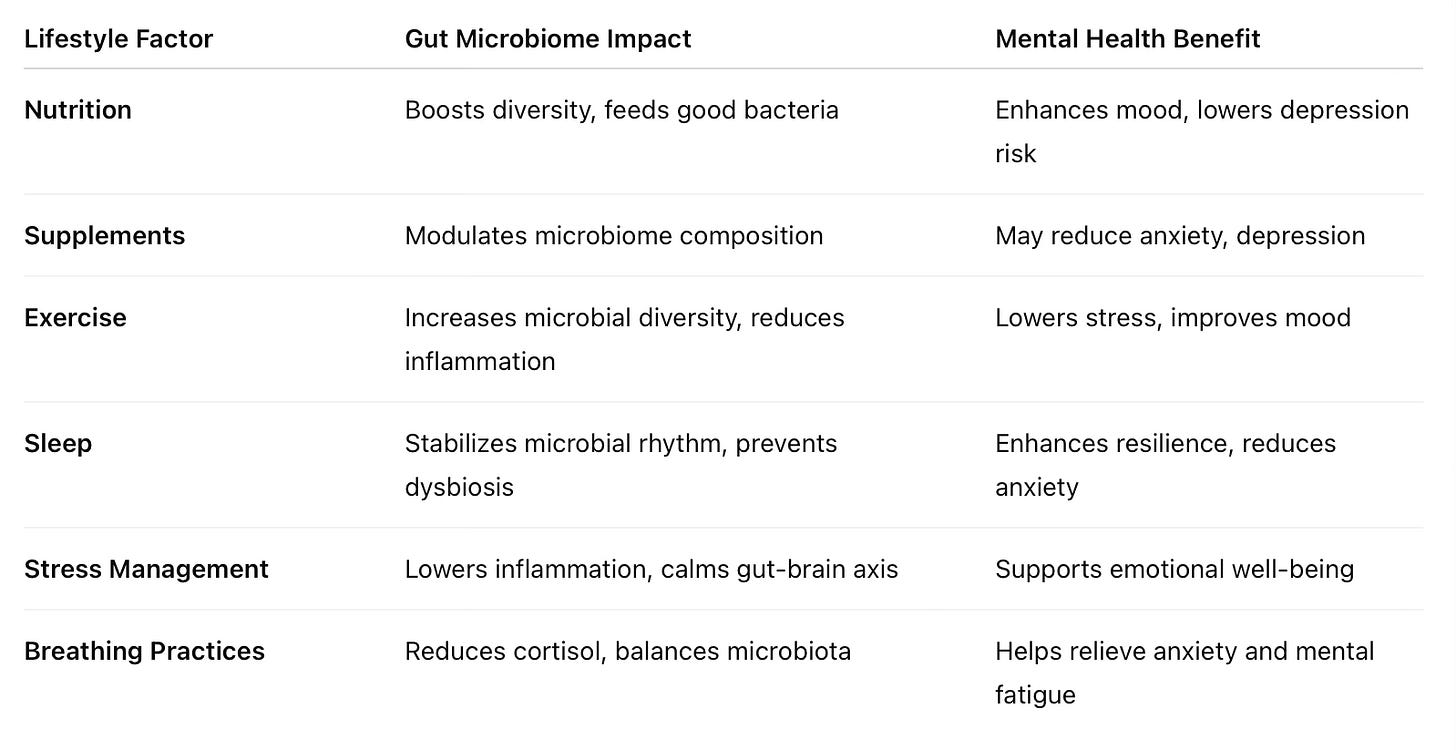Feel Better From the Inside Out: How Your Gut Microbiome Shapes Mental Health
Discover the science behind the gut-brain connection—and how simple daily habits can ease anxiety, lift your mood, and build emotional resilience.

Have you ever had a gut feeling? Or felt your stomach churn under stress?
These sensations are your body’s way of reminding you that your gut and brain are in constant conversation. And the trillions of microbes in your digestive tract play a surprisingly large role in that exchange—shaping not just digestion, but also mood, memory, and mental clarity.
Your Gut and Brain: An Ongoing Conversation
The gut-brain axis is a two-way communication network. It links your enteric nervous system (aka the “second brain” in your gut) with your central nervous system.
These systems “talk” through:
The vagus nerve (a direct neural pathway)
Hormones (like serotonin, GABA, and cortisol)
Immune signals (inflammation markers)
Microbial metabolites (especially short-chain fatty acids or SCFAs)
When your gut is balanced, this dialogue supports mental clarity, emotional balance, and stress resilience. When it’s off, it can contribute to brain fog, anxiety, depression, and mood swings.
How Gut Microbes Affect Your Mood
1. They Make Brain Chemicals ( neurotransmitters)
95% of serotonin (the "feel good" hormone) is made in the gut.
Microbes also help produce dopamine, GABA, and norepinephrine—essential for motivation, calm, and focus.
2. They Regulate Inflammation
Low-grade chronic inflammation is increasingly linked to depression and anxiety.
Balanced gut flora help keep this in check.
3. They Produce Healing Compounds
Short-chain fatty acids (like butyrate) from good bacteria help maintain the gut lining and reduce systemic inflammation.
4. They Modulate Stress Hormones
Certain microbes help regulate cortisol—the body’s main stress hormone—helping you feel more grounded in tough moments.
When Things Go Wrong: Dysbiosis and Mental Health
An unbalanced microbiome (called dysbiosis) can leave you feeling mentally and physically off. Research has linked dysbiosis to:
Increased risk of depression, anxiety, and bipolar disorder
Higher inflammation and oxidative stress
Gut permeability ("leaky gut"), which may impact brain health
Studies show people with higher levels of Bacteroides, Faecalibacterium, and Roseburia tend to have better mood and stress resilience. On the other hand, harmful strains like Morganella morganii may be linked to more depressive symptoms.
How to Heal Your Gut—And Support Your Mind
1. Nutrition: Feed the Good Guys
A gut-healthy diet is rich in diverse plant fibers, fermented foods, and anti-inflammatory nutrients.
Daily Action Steps:
Aim for 30+ plant foods/week (includes herbs, grains, legumes, seeds)
Include 2 servings of fermented foods daily
(yogurt, kefir, kimchi, miso, sauerkraut, etc.)Add prebiotic-rich foods like:
Garlic, leeks, onions, asparagus, green bananas, oats
Eat polyphenol-rich foods:
Berries, olives, dark chocolate (min. 70%), green tea, flaxseeds
Try tryptophan-rich foods for serotonin:
Eggs, tofu, sesame seeds, turkey, pumpkin seeds
What to Minimize:
Ultra-processed foods and additives
Refined sugar and artificial sweeteners
Excess alcohol (damages gut lining)
2. Supplements: When Food Isn’t Enough
Supplements may support your mental health—especially during times of stress or dysbiosis.
Probiotics for Mood Support:
Lactobacillus rhamnosus: May reduce anxiety
Bifidobacterium longum: Shown to improve mood and lower cortisol
Choose multi-strain, high-quality brands with CFUs ≥ 10 billion
(Shelf-stable or refrigerated, depending on the strain)
Prebiotics:
Look for inulin, galacto-oligosaccharides (GOS), or resistant starch
Start slow (1/2 tsp/day) to avoid bloating
Synbiotics = Probiotics + Prebiotics
These can enhance absorption and support balance more efficiently
Always consult a practitioner before starting new supplements, especially if you have IBS, SIBO, or autoimmune issues.
3. Movement: Microbe-Boosting Exercise
Physical activity supports gut diversity and reduces stress hormones.
Try:
30 minutes of movement daily
(brisk walking, cycling, swimming, dancing)Yoga or stretching 2–3x/week for vagus nerve activation
Strength training 1–2x/week (muscle health = better metabolic resilience)
Bonus: Morning outdoor walks also support circadian rhythm and sleep, which influence the gut.
4. Sleep: The Microbial Reset Button
Microbes follow your circadian rhythm. Poor or irregular sleep disrupts this balance.
Support Sleep with:
7–9 hours of consistent sleep
A wind-down ritual (low lights, soft music, journaling)
Avoid screens 1 hour before bed
No caffeine after 2 p.m., especially if you’re anxious
Try magnesium-rich foods in the evening: pumpkin seeds, spinach, bananas
5. Stress: The Hidden Gut Disruptor
Chronic stress shifts your microbiome toward harmful strains, increases gut permeability, and raises inflammation.
Daily Calm Practices:
10–20 minutes of mindfulness or meditation
Guided imagery or nature sounds while lying down
Journaling: especially gratitude or emotional dumping before bed
Daily tech breaks to reduce cognitive overload
Breathing for the Gut-Brain Reset
Your breath is your quickest access to nervous system balance.
Try this 4-6-8 breath:
Inhale for 4 seconds
Hold for 6 seconds
Exhale for 8 seconds
Repeat for 4–5 rounds
This activates your vagus nerve, signaling the body to relax and shift into “rest and digest” mode. Practiced regularly, it can lower cortisol, support digestion, and reduce anxiety.
Other options:
Box breathing (4-4-4-4)
Alternate nostril breathing (nadi shodhana)
Humming or chanting: Vibrations stimulate the vagus nerve
Summary Table: Lifestyle Habits and Their Mental Health Impact
Your gut is a garden. What you plant, nourish, and prune each day determines the emotional harvest.
Final Thoughts: Tiny Shifts, Big Relief
Your microbiome is dynamic—it shifts with your habits, your food, your stress, and even your joy.
So don’t aim for perfection. Choose one small shift:
Add one fermented food to your breakfast.
Walk for 20 minutes while listening to birdsong.
Practice five rounds of conscious breath.
Each step is a gentle nudge toward balance. Toward clarity. Toward feeling like yourself again.
Liked this piece?
Subscribe to get more on gut health, mental resilience, and food rituals that feel good from the inside out.



Thank you for sharing, Pratibha! Excellent blend of science and practical advice.